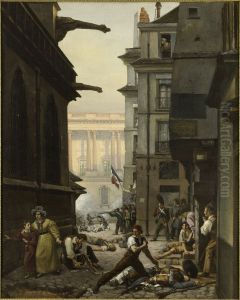Paul Claudel Paintings
Paul Claudel was a French poet, playwright, essayist, and diplomat, born on August 6, 1868, in Villeneuve-sur-Fère, France. He was the younger brother of the sculptor Camille Claudel. His early education was at the hands of his mother, who instilled in him a love for literature and the arts. Claudel attended the Paris Institute of Political Studies (Sciences Po) and began a career in diplomacy that would take him all over the world, including posts in China, Japan, Brazil, and several European countries.
Claudel's literary career is often associated with his fervent Catholic faith, which significantly influenced his writing. He experienced a profound and sudden spiritual awakening on Christmas Day in 1886, while attending Vespers at Notre Dame Cathedral in Paris. This pivotal moment led to a renewed Christian faith that became central to his poetic and dramatic works. His writings often explore themes of faith, redemption, and the human condition, marked by a rich use of language and powerful imagery.
Among Claudel's notable works are his early poems, such as 'Cinq Grandes Odes' (Five Great Odes), and plays like 'L'Annonce faite à Marie' (The Tidings Brought to Mary) and 'Le Soulier de satin' (The Satin Slipper). The latter is considered his masterpiece, an epic drama that spans continents and centuries, reflecting the complexity and depth of his vision. His literary output was diverse, also including essays and translations of texts such as the Psalms.
Claudel's diplomatic career allowed him to cultivate a broad perspective on world cultures, which fed into his literary work. Despite his extensive travels and the demands of his official duties, he maintained a prolific output as a writer. His works were often met with critical acclaim in his native France and abroad, although his style and religious content sometimes drew controversy in the increasingly secular intellectual climate of the time.
Paul Claudel died on February 23, 1955, in Paris. His legacy endures in the form of his extensive contributions to French literature and drama, and his works continue to be studied and performed. Claudel's life and oeuvre are remembered for their profound spirituality and the enduring questions they raise about the human experience and divine transcendence.
